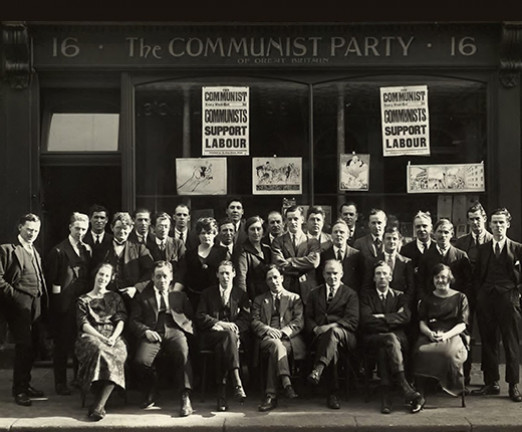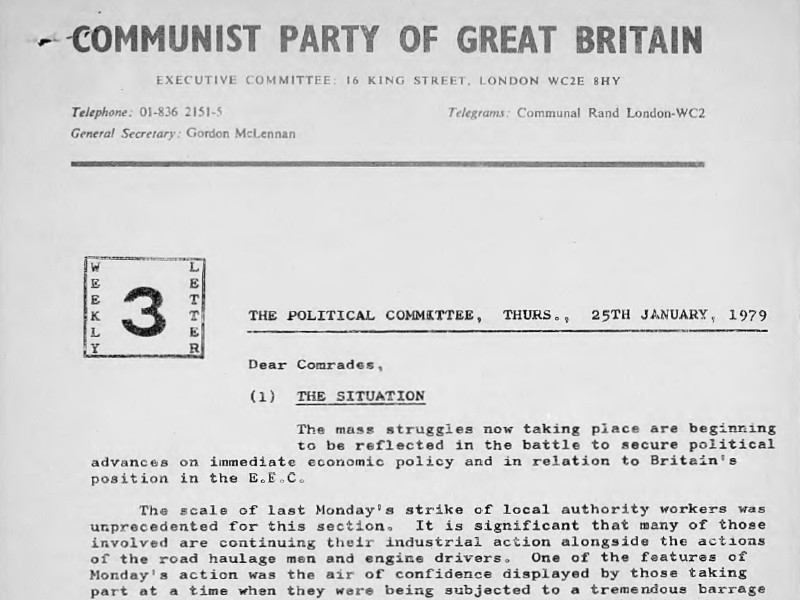
Policymaking and Revolutionary Politics, 1924–1991

The Political Committee (PC) papers
The Political Committee shall have the responsibility for giving prompt and effective leadership in between meetings of the Executive Committee.1959 Party Congress
Access the full collection
Access the full archive of Policymaking and Revolutionary Politics, 1924–1991.
Institutional Free Trial
Start your free trialRegister for a free 30-day trial of Policymaking and Revolutionary Politics, 1924–1991, for your institution.
Institutional Sales
Visit Sales PagesellFor more information on institutional access, visit our sales page.
Already have a license? Sign in.
Study CPGB management, leadership, and perspectives on domestic and international policy issues

The Political Committee of the Communist Party of Great Britain (CPGB) was a subsidiary of the Executive Committee. It was responsible for determining the party’s policy positions. Due to the CPGB being unable to maintain a full time Executive Committee, the Political Committee emerged as the de facto leadership body of the party. This collection contains materials from the Political Bureau during the CPGB’s early years of great optimism and hope, to the Political Committee that helped toe-the-line for the Soviet Union during the Cold War and eventually collapsed with it.
The documents offer a vast and fascinating perspective on the stances that the CPGB took towards ongoing issues in British and international politics. As such, the documents detail political debates including treatment of the Windrush generation of immigrants, Britain’s controversial entry into the European Community, and Soviet intervention in the Eastern bloc.
The collection is accompanied by three contextual essays written by Professor Kevin Morgan.
Contents

Highlights

Licensed to access Establishment of the Political Bureau, November 1924

Licensed to access New Leadership and the Hungarian Revolution, December 1956

Licensed to access ‘Transforming’ the Communist Party of Great Britain, April–June 1991
Insights
- The Political Bureau of the Communist Party of Great Britain (CPGB) was established in the early 1920s. The first batch of material from the 1920s shows how and what decisions were taken during the CPGB’s formative years.
- After the Political Bureau transformed into the Political Committee, the material becomes more uniform and extensive, reflecting the CPGB’s development of a sophisticated party apparatus and the increased scope of their activities.
The Political Committee usually met once a week to discuss and decide on party policy and direction. Minutes and newsletters written by the Political Committee offer a valuable and fascinating insight into the political issues of the day, in both Britain and the wider world.
- As such, the collection offers concise left-wing perspectives on a range of historical events, including everything from British industrial disputes to Cold War proxy wars across the globe.
- As well as covering outward politics and external policy issues, the Political Committee spent much time discussing internal problems, like party discipline, membership numbers, and adjacent campaigns.
- Much of the material is complemented by hand-written notes by key figures from the Political Committee, including Bill Wainwright, Reuben Falber, and Margaret Woddis. These notes offer a candid look at the perspectives of those intimately involved in the work of the Political Committee.
Unlock Historical Research for Your Institution
Provide your students and researchers with direct access to unique primary sources.
Related Media


The Departments of the Communist Party of Great Britain: A Detailed Guide Contextual Essays








